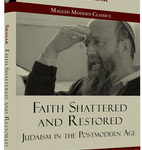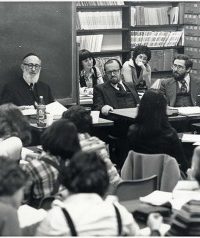Reviewed Book: R. Berel Wein and R. Warren Goldstein, The Legacy: Teachings for Life from the Great Lithuanian Rabbis (New Milford, CT and Jerusalem, Israel: Maggid Books, 2012). Available for purchase at www.korenpub.com/EN or via Amazon.com.
“Lithuanian Jewry is no more,” writes R. Berel Wein at the conclusion of his latest publication, coauthored with R. Warren Goldstein, The Legacy: Teachings for Life from the Great Lithuanian Rabbis, “but even in its death, just as it was in its life – its influence, disproportionate to its numbers and social power, remains a beacon of Torah light and instruction for all who seek it.”[i] The authors, both students of rebbeim from the Lithuanian tradition, shed light on the values that the Torah leaders of Lithuania lived by, with the goal of inspiring readers of The Legacy to implement those teachings in their own lives. While the book is primarily focused on transmitting the mussar lessons that the great Lithuanian rabbis lived by, it also provides a glimpse into the world of Lithuanian Jewry, which despite its near total destruction during World War II, has and continues to deeply influence the lives of Jews throughout the world.[ii]
Although The Legacy is more concerned with relaying the values of the Lithuanian rabbis than telling the history of Lithuanian Jewry, the book does contain two chapters with a heavy historical focus. The two chapters, both written by R. Wein, go through the fascinating history of the Mussar Movement and the Yeshiva Movement, which could be of interest to a reader looking to learn more about the historical context of pre-war Lithuania. The remaining chapters are essays, authored either by R. Wein or by R. Goldstein, which discuss specific values emphasized by the Lithuanian rabbis. While the order in which the chapters are organized seems somewhat haphazard, a reader interested in focusing on spiritual growth will gain from The Legacy a deeper understanding of the values by which Lithuania’s Torah giants shaped their lives, and which are also highly relevant to any Jew living in the twenty-first century.
In the introduction to the novel, Rabbis Wein and Goldstein state their goal for The Legacy in unambiguous terms. Like the Ramban who wrote a now-famous letter to his son delineating the Torah values he felt were crucial for every Jew to live by, the authors of The Legacy attempt to “construct a virtual ‘letter’ to this generation according to the teachings and worldview of the remarkable Torah sages of Lithuanian Jewry, as [they] received these teachings from [their] own rebbeim and mentors, zt”l.”[iii] As Avraham Kariv, a Lithuanian born Hebrew author who later immigrated to the Land of Israel, wrote in his memoir, a visitor to Lithuania may have easily visited the country and left without understanding the true nature of a typical Lithuanian Jew. Rather, “in order to recognize and truly appreciate the character of a Lithuanian Jew,” he wrote that it was necessary for one to “listen carefully and see deeply.”[iv] Rabbis Wein and Goldstein attempt throughout the course of their publication to elucidate for the Jews of this generation, who can no longer visit the Lithuanian Jewish community for themselves, the values that the leaders of that community emphasized throughout their lifetimes, and the impact those values had on Lithuanian Jewry and European Jewry more broadly.
The authors explore, in depth, a number of the values that were impressed upon them by their rebbeim, discussing those character traits using a variety of sources, including classical sources such as Tanakh, Talmud, and the works of Rambam, as well as personal anecdotes from their rebbeim. Some of the values that the authors discuss include being a mensch, avoiding mahloket, engaging in Torah learning, and involving oneself in the building of the Jewish community.
One chapter that I found particularly interesting, entitled “Eirlichkeit: Honesty, Integrity, and Humility,” contrasts the values of eirlichkeit and frumkeit, the latter of which Goldstein defines simply as being “religious.”[v] Goldstein quotes an old Lithuanian saying- “A Jew is not frum – a Jew is eirlich” – and offers the following in explanation: “the very essence of a Jew is not his level of religiosity, but his level of eirlichkeit, connoting honesty, integrity, and uprightness.”[vi]
R. Goldstein cites the Gemara in Hullin and R. Avraham Yitzchok Bloch’s understanding of that Gemara in support of the adage. The Gemara tells the story of Mar Ukva, who described himself as “vinegar, the son of wine,” because while Mar Ukva’s father would wait a full twenty-four hours between eating meat and dairy, Mar Ukva himself would wait only until his next meal before eating dairy.[vii] R. Bloch asks regarding this Gemara: Why did Mar Ukva not simply wait twenty-four hours like his father, if he thought so highly of his father’s actions? R. Bloch answers that Mar Ukva must have felt that for him to wait the extended period of time in imitation of his father would have been a corruption of his integrity, because he felt he was on a lower spiritual level than his father, and he, therefore, should not accept upon himself extra stringencies as if they were on the same level.[viii] Goldstein describes someone whose religious conduct is inconsistent with his general behavior as “not being honest with himself,”[ix] and continues on in the chapter to cite examples of other Lithuanian rabbis discouraging similar behavior. The tension that exists between appearing superficially more religious than one might feel she truly is, and taking on humrot (stringencies) with the hope that they will stimulate spiritual growth, is a tension that exists today as much as, if not more so than, it did in Lithuania a century ago.
One theme that reappears throughout the book is the resilience with which Lithuanian Jews and their leaders faced times of sorrow and tragedy. Despite the difficulties involved in living in Lithuania in the nineteenth andtwentieth centuries, with its “chronically weak economy,”[x] harsh weather, and deeply rooted antisemitism, the Lithuanian rabbis always stressed in their communities the importance of avoiding becoming depressed. Rather, the rabbis underscored the necessity of “remain[ing] creative, cheerful, firmly idealistic, and optimistic,” especially because these traits are a result of deveikut – the clinging to God and imitation of His ways.[xi]
The leaders of Lithuanian Jewry not only preached the importance of remaining optimistic, but also practiced it in their personal lives. Rabbis Wein and Goldstein bring numerous examples of the strength of character displayed by their rebbeim at times of both personal and national tragedy. R. Goldstein writes that in times of hardship, Lithuanian rabbis would often quote the verse from Tehillim: “Were it not for your Torah, which is my delight, I would have been lost in my affliction.”[xii] According to reports, after the death of his daughter, this pasuk became a “life-song” for R. Eliezer Shach, “accompanying [him] through privation and hunger, through exile and anonymity, and ultimately to the Holy Land.”[xiii]
Another example can be found in the almost inhuman strength displayed by R. Elyah Meir Bloch and R. Moredchai Katz in July of 1941, when, after having been sent to America to secure visas for the Jewish community of Telz, they learned of the total destruction of their community by the Germans. In an instant, they discovered that nearly everyone they had known had been murdered by the Nazis, including all of R. Elyah’s siblings, his wife, and with the exception of one daughter, all of his children, as well as R. Katz’s wife and ten children. In spite of the tremendous pain and psychological torment they must have experienced, the two rabbis did not submit to despair, and, instead, focused all of their efforts on the construction of a new Telz yeshivah in Cleveland, which opened its doors in 1942, while the Holocaust was still in its full ugly force. R. Goldstein writes that Rabbis Bloch and Katz were filled with a sense of divine mission to rebuild kelal Yisrael, and this enabled them to prevent submitting to a depression that would have been so easy to succumb to.[xiv]
While the Lithuanian Torah giants are no longer with us, they have left a lasting imprint on the Jewish world as we know it. After the war ended, R. Shlomo Kahaneman, the Ponivezher Rav, “declared that he intended to rebuild Torah in the land of Israel by reestablishing the eighteen leading yeshivas of pre-war Lithuania.”[xv] R. Wein writes that while he has not counted, he would venture to say that there are certainly more than just eighteen yeshivot in Israel today that have been influenced by the teachings of Lithuanian rebbeim.[xvi] Yeshiva University would certainly be included in the list of yeshivot that have been heavily influenced by Lithuanian Jewry, especially considering that the Rav, whose philosophy is embedded within our institution, was the descendant of a long line of Lithuanian rebbeim. For someone looking to obtain a better appreciation for some of the values that were influential in the shaping of many of the Orthodox institutions we recognize today, or would like to work on instilling those values into their own personality, The Legacy is certainly a worthwhile read.
Kimberly Hay is a junior at SCW majoring in Political Science and is a staff writer for Kol Hamevaser.
[i] R. Berel Wein and R. Warren Goldstein, The Legacy: Teachings for Life from the Great Lithuanian Rabbis (New Milford, CT and Jerusalem, Israel: Maggid Books, 2012), 194.
[ii] Ibid, 193. According to the authors, in 1939 there were slightly fewer than 300,000 Jews living in Lithuania, of whom only 2-3% survived after the onslaught of the Holocaust.
[iv] Ibid, 61. Avraham Kariv, Lita Makurasi (Tel Aviv, 1958), 48.
[v] R. Berel Wein and R. Warren Goldstein, The Legacy: Teachings for Life from the Great Lithuanian Rabbis (New Milford, CT and Jerusalem, Israel: Maggid Books, 2012), 63.
[viii] Shiurei Da’as, 174-175.
[ix] R. Berel Wein and R. Warren Goldstein, The Legacy: Teachings for Life from the Great Lithuanian Rabbis (New Milford, CT and Jerusalem, Israel: Maggid Books, 2012), 72.






On Torah Values and the Courage to Rebuild: A Review of The Legacy
Reviewed Book: R. Berel Wein and R. Warren Goldstein, The Legacy: Teachings for Life from the Great Lithuanian Rabbis (New Milford, CT and Jerusalem, Israel: Maggid Books, 2012). Available for purchase at www.korenpub.com/EN or via Amazon.com.
“Lithuanian Jewry is no more,” writes R. Berel Wein at the conclusion of his latest publication, coauthored with R. Warren Goldstein, The Legacy: Teachings for Life from the Great Lithuanian Rabbis, “but even in its death, just as it was in its life – its influence, disproportionate to its numbers and social power, remains a beacon of Torah light and instruction for all who seek it.”[i] The authors, both students of rebbeim from the Lithuanian tradition, shed light on the values that the Torah leaders of Lithuania lived by, with the goal of inspiring readers of The Legacy to implement those teachings in their own lives. While the book is primarily focused on transmitting the mussar lessons that the great Lithuanian rabbis lived by, it also provides a glimpse into the world of Lithuanian Jewry, which despite its near total destruction during World War II, has and continues to deeply influence the lives of Jews throughout the world.[ii]
Although The Legacy is more concerned with relaying the values of the Lithuanian rabbis than telling the history of Lithuanian Jewry, the book does contain two chapters with a heavy historical focus. The two chapters, both written by R. Wein, go through the fascinating history of the Mussar Movement and the Yeshiva Movement, which could be of interest to a reader looking to learn more about the historical context of pre-war Lithuania. The remaining chapters are essays, authored either by R. Wein or by R. Goldstein, which discuss specific values emphasized by the Lithuanian rabbis. While the order in which the chapters are organized seems somewhat haphazard, a reader interested in focusing on spiritual growth will gain from The Legacy a deeper understanding of the values by which Lithuania’s Torah giants shaped their lives, and which are also highly relevant to any Jew living in the twenty-first century.
In the introduction to the novel, Rabbis Wein and Goldstein state their goal for The Legacy in unambiguous terms. Like the Ramban who wrote a now-famous letter to his son delineating the Torah values he felt were crucial for every Jew to live by, the authors of The Legacy attempt to “construct a virtual ‘letter’ to this generation according to the teachings and worldview of the remarkable Torah sages of Lithuanian Jewry, as [they] received these teachings from [their] own rebbeim and mentors, zt”l.”[iii] As Avraham Kariv, a Lithuanian born Hebrew author who later immigrated to the Land of Israel, wrote in his memoir, a visitor to Lithuania may have easily visited the country and left without understanding the true nature of a typical Lithuanian Jew. Rather, “in order to recognize and truly appreciate the character of a Lithuanian Jew,” he wrote that it was necessary for one to “listen carefully and see deeply.”[iv] Rabbis Wein and Goldstein attempt throughout the course of their publication to elucidate for the Jews of this generation, who can no longer visit the Lithuanian Jewish community for themselves, the values that the leaders of that community emphasized throughout their lifetimes, and the impact those values had on Lithuanian Jewry and European Jewry more broadly.
The authors explore, in depth, a number of the values that were impressed upon them by their rebbeim, discussing those character traits using a variety of sources, including classical sources such as Tanakh, Talmud, and the works of Rambam, as well as personal anecdotes from their rebbeim. Some of the values that the authors discuss include being a mensch, avoiding mahloket, engaging in Torah learning, and involving oneself in the building of the Jewish community.
One chapter that I found particularly interesting, entitled “Eirlichkeit: Honesty, Integrity, and Humility,” contrasts the values of eirlichkeit and frumkeit, the latter of which Goldstein defines simply as being “religious.”[v] Goldstein quotes an old Lithuanian saying- “A Jew is not frum – a Jew is eirlich” – and offers the following in explanation: “the very essence of a Jew is not his level of religiosity, but his level of eirlichkeit, connoting honesty, integrity, and uprightness.”[vi]
R. Goldstein cites the Gemara in Hullin and R. Avraham Yitzchok Bloch’s understanding of that Gemara in support of the adage. The Gemara tells the story of Mar Ukva, who described himself as “vinegar, the son of wine,” because while Mar Ukva’s father would wait a full twenty-four hours between eating meat and dairy, Mar Ukva himself would wait only until his next meal before eating dairy.[vii] R. Bloch asks regarding this Gemara: Why did Mar Ukva not simply wait twenty-four hours like his father, if he thought so highly of his father’s actions? R. Bloch answers that Mar Ukva must have felt that for him to wait the extended period of time in imitation of his father would have been a corruption of his integrity, because he felt he was on a lower spiritual level than his father, and he, therefore, should not accept upon himself extra stringencies as if they were on the same level.[viii] Goldstein describes someone whose religious conduct is inconsistent with his general behavior as “not being honest with himself,”[ix] and continues on in the chapter to cite examples of other Lithuanian rabbis discouraging similar behavior. The tension that exists between appearing superficially more religious than one might feel she truly is, and taking on humrot (stringencies) with the hope that they will stimulate spiritual growth, is a tension that exists today as much as, if not more so than, it did in Lithuania a century ago.
One theme that reappears throughout the book is the resilience with which Lithuanian Jews and their leaders faced times of sorrow and tragedy. Despite the difficulties involved in living in Lithuania in the nineteenth andtwentieth centuries, with its “chronically weak economy,”[x] harsh weather, and deeply rooted antisemitism, the Lithuanian rabbis always stressed in their communities the importance of avoiding becoming depressed. Rather, the rabbis underscored the necessity of “remain[ing] creative, cheerful, firmly idealistic, and optimistic,” especially because these traits are a result of deveikut – the clinging to God and imitation of His ways.[xi]
The leaders of Lithuanian Jewry not only preached the importance of remaining optimistic, but also practiced it in their personal lives. Rabbis Wein and Goldstein bring numerous examples of the strength of character displayed by their rebbeim at times of both personal and national tragedy. R. Goldstein writes that in times of hardship, Lithuanian rabbis would often quote the verse from Tehillim: “Were it not for your Torah, which is my delight, I would have been lost in my affliction.”[xii] According to reports, after the death of his daughter, this pasuk became a “life-song” for R. Eliezer Shach, “accompanying [him] through privation and hunger, through exile and anonymity, and ultimately to the Holy Land.”[xiii]
Another example can be found in the almost inhuman strength displayed by R. Elyah Meir Bloch and R. Moredchai Katz in July of 1941, when, after having been sent to America to secure visas for the Jewish community of Telz, they learned of the total destruction of their community by the Germans. In an instant, they discovered that nearly everyone they had known had been murdered by the Nazis, including all of R. Elyah’s siblings, his wife, and with the exception of one daughter, all of his children, as well as R. Katz’s wife and ten children. In spite of the tremendous pain and psychological torment they must have experienced, the two rabbis did not submit to despair, and, instead, focused all of their efforts on the construction of a new Telz yeshivah in Cleveland, which opened its doors in 1942, while the Holocaust was still in its full ugly force. R. Goldstein writes that Rabbis Bloch and Katz were filled with a sense of divine mission to rebuild kelal Yisrael, and this enabled them to prevent submitting to a depression that would have been so easy to succumb to.[xiv]
While the Lithuanian Torah giants are no longer with us, they have left a lasting imprint on the Jewish world as we know it. After the war ended, R. Shlomo Kahaneman, the Ponivezher Rav, “declared that he intended to rebuild Torah in the land of Israel by reestablishing the eighteen leading yeshivas of pre-war Lithuania.”[xv] R. Wein writes that while he has not counted, he would venture to say that there are certainly more than just eighteen yeshivot in Israel today that have been influenced by the teachings of Lithuanian rebbeim.[xvi] Yeshiva University would certainly be included in the list of yeshivot that have been heavily influenced by Lithuanian Jewry, especially considering that the Rav, whose philosophy is embedded within our institution, was the descendant of a long line of Lithuanian rebbeim. For someone looking to obtain a better appreciation for some of the values that were influential in the shaping of many of the Orthodox institutions we recognize today, or would like to work on instilling those values into their own personality, The Legacy is certainly a worthwhile read.
Kimberly Hay is a junior at SCW majoring in Political Science and is a staff writer for Kol Hamevaser.
[i] R. Berel Wein and R. Warren Goldstein, The Legacy: Teachings for Life from the Great Lithuanian Rabbis (New Milford, CT and Jerusalem, Israel: Maggid Books, 2012), 194.
[ii] Ibid, 193. According to the authors, in 1939 there were slightly fewer than 300,000 Jews living in Lithuania, of whom only 2-3% survived after the onslaught of the Holocaust.
[iii] Ibid, xiii.
[iv] Ibid, 61. Avraham Kariv, Lita Makurasi (Tel Aviv, 1958), 48.
[v] R. Berel Wein and R. Warren Goldstein, The Legacy: Teachings for Life from the Great Lithuanian Rabbis (New Milford, CT and Jerusalem, Israel: Maggid Books, 2012), 63.
[vi] Ibid.
[vii] Hullin, 105a.
[viii] Shiurei Da’as, 174-175.
[ix] R. Berel Wein and R. Warren Goldstein, The Legacy: Teachings for Life from the Great Lithuanian Rabbis (New Milford, CT and Jerusalem, Israel: Maggid Books, 2012), 72.
[x] Ibid, 60.
[xi] Ibid.
[xii] Psalms 119:92.
[xiii] Ibid, 97.
[xiv] Ibid, 178-179.
[xv] Ibid, 193.
[xvi] Ibid.